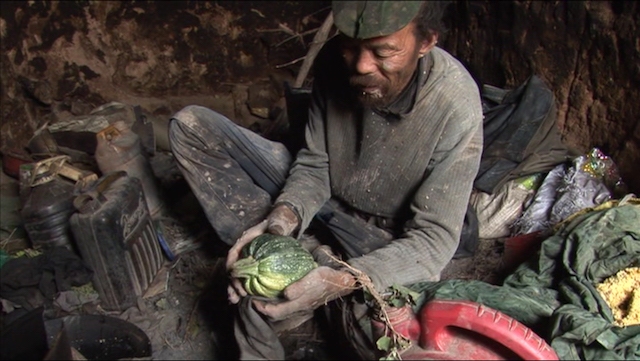Chinese filmmaker Wang Bing makes documentaries that closely observe their people, employing extraordinary physical proximity given the artist’s long, unhurried regard. Two of the relatively small number of works he has produced since 2002, played successively on a single screen, make up his Kunsthalle Zürich exhibition: Mrs. Fang (2018), in an extended version of the film first shown at Documenta 14 in 2017; and Man with No Name from 2010. The latter, 99 minutes long, follows a man subsisting in rudimentary shelters dug into and built out of rural land outside Beijing that is alternately muddy and dusty, which he cultivates for his food. Mrs. Fang observes the eponymous subject and her acquaintances for 102 minutes as she lies on her deathbed, her surrounding family and neighbours passing the time chatting, watching television, examining their phones and making illegal nighttime forays into electrofishing.
Wang’s apparently unfettered access to his subjects suggests most of them have absolute trust in the filmmaker and his colleagues, to the degree that the camera is generally ignored. He records inside the man’s small, abject shelters, watches dirt-smeared hands prepare food and make repairs; we see inescapable mud in the fabric of everything, deliberate movements, moments of stillness and occasional inexplicably violent gestures. The man speaks rarely, and when he does it’s seemingly not to anyone in particular. Distant traffic can be heard from time to time, but as the seasons pass the man’s universe remains tiny. All his accoutrements are broken or worn, plastic bags pile up around his cooking pot and his chopsticks are twigs, yet his actions suggest that he has a place and purpose for all the things around him. Mrs Fang, on the other hand, could not have consented to this film: in the short opening section, during which she considers the camera, she is already silenced by dementia. Cut to a year later and she is skeletal, lying under a duvet cover with her mouth apart and eyes open but rarely focused. Communication seems impossible, so her children monitor her pulse and try to raise a reaction from her. When she rolls to one side, hands gather her back to a safe position. Life goes on while she is stuck in limbo.
Both films are portraits, though their greatest revelations come through effectively turning a mirror on the viewer. The sight is neither pretty nor comfortable. Wang makes us consider poverty long after we would like to look away. The gallery viewer is manifest proof of inequality of income and prospect. We are enjoying health, at least relatively, and clear perception as life seeps out of Mrs Fang. Greater understanding may bring greater respect, but the artist also illuminates the yawning gaps in that understanding. While all of us on earth must live and die, our perspectives are utterly different; sensitivity to the plight of others absolves us of nothing. In our Western ivory towers (and if ever there was an ivory tower city, it’s Zürich) we bemoan the plastic that litters the world – and the man’s mud dwellings – while enjoying its convenience. We may wince at the sight of scales being scraped off a still-living fish, yet Wang’s cast are trawling polluted backwaters for the few fish that survive the industrialisation, fed by European buyers, that is all around them. Thus he collapses the distance between us and them while ensuring we know, nonetheless, how far apart we remain.
Wang Bing at Kunsthalle Zürich, 8 December – 3 February
From the March 2019 issue of ArtReview
